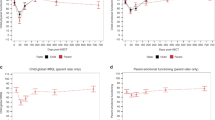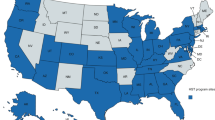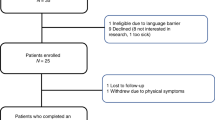Abstract
Parents are increasingly used as donors for their child’s haploidentical hematopoietic cell transplant, creating a dual role for parents that may increase the stress of caring for their ill child. Empiric research on the psychological adjustment of parental donors is lacking. We conducted a retrospective survey of parents (n = 136) whose child underwent transplant with a parental donor or a matched-unrelated donor, including both donor and nondonors, and both parents of survivors and bereaved. All parents completed standardized measures of quality of life, depression, anxiety, post-traumatic stress, and life satisfaction. Bereaved parents also completed measures of their grief response, while parents of survivors completed measures of the parent–child relationship. The overall sample reported psychological functioning near normative levels, but bereaved parents demonstrated significantly poorer outcomes across all measures. The effect of donor status differed by transplant outcome: for parents of survivors, donors reported better mental health than nondonors, but amongst bereaved parents, donors fared more poorly than nondonors. Bereaved donors reported greater difficulties with grief than nondonors. Results suggest that serving as donor can be a double-edged sword, acting as a protective factor when there is a successful outcome but a significant risk factor when the child does not survive.
This is a preview of subscription content, access via your institution
Access options
Subscribe to this journal
Receive 12 print issues and online access
$259.00 per year
only $21.58 per issue
Buy this article
- Purchase on Springer Link
- Instant access to full article PDF
Prices may be subject to local taxes which are calculated during checkout


Similar content being viewed by others
References
Passweg JR, Baldomero H, Bader P, Bonini C, Duarte RF, Dufour C, et al. Use of haploidentical stem cell transplantation continues to increase: the 2015 European Society for Blood and Marrow Transplant activity survey report. Bone Marrow Transplant. 2017;52:811–7. https://doi.org/10.1038/bmt.2017.34.
Watanabe M, Kanda J. Recent progress in haploidentical transplantation: is this the optimal choice for alternative donor transplantation? Curr Opin Hematol. 2019;26:406–12. https://doi.org/10.1097/MOH.0000000000000532.
Symons HJ, Zahurak M, Cao Y, Chen A, Cooke K, Gamper C, et al. Myeloablative haploidentical BMT with posttransplant cyclophosphamide for hematologic malignancies in children and adults. Blood Adv. 2020;4:3913–25. https://doi.org/10.1182/bloodadvances.2020001648.
Locatelli F, Merli P, Pagliara D, Li Pira G, Falco M, Pende D, et al. Outcome of children with acute leukemia given HLA-haploidentical HSCT after αβ T-cell and B-cell depletion. Blood. 2017;130:677–85. https://doi.org/10.1182/blood-2017-04-779769.
Mamcarz E, Madden R, Qudeimat A, Srinivasan A, Talleur A, Sharma A, et al. Improved survival rate in T-cell depleted haploidentical hematopoietic cell transplantation over the last 15 years at a single institution. Bone Marrow Transplant. 2020;55:929 https://doi.org/10.1038/s41409-019-0750-7.
Barrera M, Atenafu E, Doyle J, Berlin-Romalis D, Hancock K. Differences in mothers’ and fathers’ psychological distress after pediatric SCT: a longitudinal study. Bone Marrow Transplant. 2012;47:934–9. https://doi.org/10.1038/bmt.2011.206.
Packman W, Weber S, Wallace J, Bugescu N. Psychological effects of hematopoietic SCT on pediatric patients, siblings and parents: a review. Bone Marrow Transplant. 2010;45:1134–46. https://doi.org/10.1038/bmt.2010.74.
Lindwall JJ, Russell K, Huang Q, Zhang H, Vannatta K, Barrera M, et al. Adjustment in parents of children undergoing stem cell transplantation. Biol Blood Marrow Transplant. 2014;20:543–8. https://doi.org/10.1016/j.bbmt.2014.01.007.
Patterson JM, Holm KE, Gurney JG. The impact of childhood cancer on the family: a qualitative analysis of strains, resources, and coping behaviors. Psychooncology. 2004;13:390–407. https://doi.org/10.1002/pon.761.
Katz LF, Fladeboe K, King K, Gurtovenko K, Kawamura J, Friedman D, et al. Trajectories of child and caregiver psychological adjustment in families of children with cancer. Health Psychol. 2018;37:725–35. https://doi.org/10.1037/hea0000619.
Howard Sharp KM, Fisher RS, Clark OE, Dunnells ZDO, Murphy LK, Prussien KV, et al. Long-term trajectories of depression symptoms in mothers of children with cancer. Health Psychol. 2020;39:89–98. https://doi.org/10.1037/hea0000826.
Dolgin MJ, Phipps S, Fairclough DL, Sahler OJ, Askins M, Noll RB, et al. Trajectories of adjustment in mothers of children with newly diagnosed cancer: a natural history investigation. J Pediatr Psychol. 2007;32:771–82. https://doi.org/10.1093/jpepsy/jsm013.
Klassen AF, Klaassen R, Dix D, Pritchard S, Yanofsky R, O’Donnell M, et al. Impact of caring for a child with cancer on parents’ health-related quality of life. J Clin Oncol. 2008;26:5884–9. https://doi.org/10.1200/JCO.2007.15.2835.
Wakefield CE, McLoone JK, Evans NT, Ellis SJ, Cohn RJ. It’s more than dollars and cents: the impact of childhood cancer on parents’ occupational and financial health. J Psychosoc Oncol. 2014;32:602–21. https://doi.org/10.1080/07347332.2014.936653.
Ward J, Fogg L, Rodgers C, Breitenstein S, Kapoor N, Swanson BA. Parent psychological and physical health outcomes in pediatric hematopoietic stem cell transplantation. Cancer Nurs. 2019;42:448–57. https://doi.org/10.1097/NCC.0000000000000652.
Manne S, Mee L, Bartell A, Sands S, Kashy DA. A randomized clinical trial of a parent-focused social-cognitive processing intervention for caregivers of children undergoing hematopoetic stem cell transplantation. J Consult Clin Psychol. 2016;84:389–401. https://doi.org/10.1037/ccp0000087.
Sahler OJZ, Dolgin MJ, Phipps S, Fairclough DL, Askins MS, Katz ER, et al. Specificity of problem-solving skills training in mothers of children newly diagnosed with cancer: results of a multisite randomized clinical trial. J Clin Oncol. 2013;31:1329–35. https://doi.org/10.1200/JCO.2011.39.1870.
González-Vicent M, Díaz Perez MA. Allogeneic hematopoietic stem-cell transplantation from haploidentical donors using “ex-vivo” T-cell depletion in pediatric patients with hematological malignancies: state of the art review. Curr Opin Oncol. 2018;30:396–401. https://doi.org/10.1097/CCO.0000000000000480.
van Walraven SM, Ball LM, Koopman HM, Switzer GE, Ropes-de Jong CM, de Jong A, et al. Managing a dual role–experiences and coping strategies of parents donating haploidentical G-CSF mobilized peripheral blood stem cells to their children. Psychooncology. 2012;21:168–75. https://doi.org/10.1002/pon.1885.
Packman WL, Crittenden MR, Schaeffer E, Bongar B, Fischer JB, Cowan MJ. Psychosocial consequences of bone marrow transplantation in donor and nondonor siblings. J Dev Behav Pediatr. 1997;18:244–53.
MacLeod KD, Whitsett SF, Mash EJ, Pelletier W. Pediatric sibling donors of successful and unsuccessful hematopoietic stem cell transplants (HSCT): a qualitative study of their psychosocial experience. J Pediatr Psychol. 2003;28:223–30. https://doi.org/10.1093/jpepsy/jsg010.
Switzer GE, Bruce J, Kiefer DM, Kobusingye H, Drexler R, Besser RM, et al. Health-related quality of life among pediatric hematopoietic stem cell donors. J Pediatr. 2016;178:164–170.e1. https://doi.org/10.1016/j.jpeds.2016.07.009.
Hutt D, Nehari M, Munitz-Shenkar D, Alkalay Y, Toren A, Bielorai B. Hematopoietic stem cell donation: psychological perspectives of pediatric sibling donors and their parents. Bone Marrow Transplant. 2015;50:1337–42. https://doi.org/10.1038/bmt.2015.152.
Pulsipher MA, Chitphakdithai P, Logan BR, Navarro WH, Levine JE, Miller JP, et al. Lower risk for serious adverse events and no increased risk for cancer after PBSC vs BM donation. Blood. 2014;123:3655–63. https://doi.org/10.1182/blood-2013-12-542464.
Burns LJ, Logan BR, Chitphakdithai P, Miller JP, Drexler R, Spellman S, et al. Recovery of unrelated donors of peripheral blood stem cells versus recovery of unrelated donors of bone marrow: a prespecified analysis from the Phase III Blood and Marrow Transplant Clinical Trials Network Protocol 0201. Biol Blood Marrow Transplant. 2016;22:1108–16. https://doi.org/10.1016/j.bbmt.2016.02.018.
Lichtenthal WG, Roberts KE, Catarozoli C, Schofield E, Holland JM, Fogarty JJ, et al. Regret and unfinished business in parents bereaved by cancer: a mixed methods study. Palliat Med. 2020;34:367–77. https://doi.org/10.1177/0269216319900301.
Rosenberg AR, Baker KS, Syrjala K, Wolfe J. Systematic review of psychosocial morbidities among bereaved parents of children with cancer. Pediatr Blood Cancer. 2012;58:503–12. https://doi.org/10.1002/pbc.23386.
Snaman JM, Kaye EC, Torres C, Gibson D, Baker JN. Parental grief following the death of a child from cancer: the ongoing Odyssey. Pediatr Blood Cancer. 2016;63:1594–602. https://doi.org/10.1002/pbc.26046.
Pohlkamp L, Sveen J, Kreicbergs U, Lövgren M. Parents’ views on what facilitated or complicated their grief after losing a child to cancer. Palliat Support Care. 2020;26:1–6. https://doi.org/10.1017/S1478951520001212.
Katzan IL, Lapin B. PROMIS GH (patient-Reported Outcomes Measurement Information System Global Health) Scale in stroke: a validation study. Stroke. 2018;49:147–54.https://doi.org/10.1161/STROKEAHA.117.018766
Kroenke K, Strine TW, Spitzer RL, Williams JBW, Berry JT, Mokdad AH. The PHQ-8 as a measure of current depression in the general population. J Affect Disord. 2009;114:163–73. https://doi.org/10.1016/j.jad.2008.06.026.
Spitzer RL, Kroenke K, Williams JBW, Löwe B. A brief measure for assessing generalized anxiety disorder: the GAD-7. Arch Intern Med. 2006;166:1092–7. https://doi.org/10.1001/archinte.166.10.1092.
Blevins CA, Weathers FW, Davis MT, Witte TK, Domino JL. The posttraumatic stress disorder checklist for DSM-5 (PCL-5): development and initial psychometric evaluation. J Trauma Stress. 2015;28:489–98. https://doi.org/10.1002/jts.22059.
Diener E, Emmons RA, Larsen RJ, Griffin S. The satisfaction with life scale. J Pers Assess. 1985;49:71–75. https://doi.org/10.1207/s15327752jpa4901_13.
Prigerson HG, Horowitz MJ, Jacobs SC, Parkes CM, Aslan M, Goodkin K, et al. Prolonged grief disorder: psychometric validation of criteria proposed for DSM-V and ICD-11. PLoS Med. 2009;6. https://doi.org/10.1371/journal.pmed.1000121.
Pohlkamp L, Kreicbergs U, Prigerson HG, Sveen J. Psychometric properties of the Prolonged Grief Disorder-13 (PG-13) in bereaved Swedish parents. Psychiatry Res. 2018;267:560–5. https://doi.org/10.1016/j.psychres.2018.06.004.
Ito M, Nakajima S, Fujisawa D, Miyashita M, Kim Y, Shear MK, et al. Brief measure for screening complicated grief: reliability and discriminant validity. PloS ONE. 2012;7:e31209. https://doi.org/10.1371/journal.pone.0031209.
Kamphaus RW, Reynolds CR. PRQ Parenting Relationship Questionnaire, Manual, Bloomington, MN: Pearson; 2006.
Schaefer MR, Aguilera V, Parris K, Long A, Triplett B, Phipps S. Giving the gift of life twice: Understanding the lived experiences of parent donors and nondonors in pediatric haploidentical hematopoietic cell transplantation. Pediatr Blood Cancer. 2021:e29480. https://doi.org/10.1002/pbc.29480. Online ahead of print.
Funding
This study is supported in part by the National Institutes of Health Cancer Center Support Grant, P30 21765, and by the American Lebanese-Syrian Associated Charities (ALSAC).
Author information
Authors and Affiliations
Contributions
VA: data analysis, interpretation, and lead manuscript writing; MRS and KP: data analysis, interpretation, and manuscript review and editing; AL: data collection, data analysis and interpretation, and manuscript review and editing; BT: study design and manuscript review and editing; SP: study design, data collection, analysis, interpretation, and manuscript review and editing; and all authors: reviewed and approved submission of the manuscript in its final form.
Corresponding author
Ethics declarations
Competing interests
The authors declare no competing interests.
Additional information
Publisher’s note Springer Nature remains neutral with regard to jurisdictional claims in published maps and institutional affiliations.
Rights and permissions
About this article
Cite this article
Aguilera, V., Schaefer, M.R., Parris, K. et al. Psychosocial outcomes of parents in pediatric haploidentical transplant: parental hematopoietic cell donation as a double-edged sword. Bone Marrow Transplant 57, 377–383 (2022). https://doi.org/10.1038/s41409-021-01547-9
Received:
Revised:
Accepted:
Published:
Issue Date:
DOI: https://doi.org/10.1038/s41409-021-01547-9



